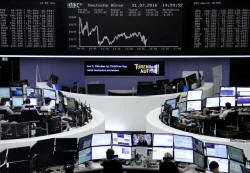|
Global stocks fall, UK
PMIs flash Brexit recession warning
 Send a link to a friend
Send a link to a friend
 [July 22, 2016]
By Jamie McGeever [July 22, 2016]
By Jamie McGeever
LONDON (Reuters) - Shares fell on
Friday after soft U.S. corporate results pulled Wall Street back
from record highs, and sterling slumped as the first snapshot of the
UK economy since the vote last month to leave the European Union
painted a bleak picture.
European stocks and MSCI's leading global share index were both on
course for their first consecutive daily losses in two weeks, while
Japan's Nikkei posted its biggest decline over the same period.
U.S. stock futures pointed to a slightly higher open on Friday
<ESc1>.
British purchasing managers data showed manufacturing and services
activity plunged in July, a fall consistent with a broader 0.4
percent economic contraction in the third quarter and raising the
probability of recession.
"It wasn't exactly a big surprise to see confidence in both sectors
take a hit, but what was a concern was the size of the hit to the
services sector, the main engine of growth for the UK economy," said
Craig Erlam, senior market analyst at Oanda.
"If we continue to see these kinds of figures in the coming months,
the economy could be headed for recession before the year is out,"
he said.
The pound fell nearly two cents to $1.31 <GBP=>, back to within a
couple of cents of the 31-year low struck earlier this month
following the June 23 EU referendum.

The weaker exchange rate lifted UK stocks up into positive territory
and within sight of last week's 11-month high. The FTSE 100 index,
which derives most of its earnings from abroad, rose 0.4 percent to
6,727 points.
Europe's FTSEuroFirst index of leading 300 shares <.FTEU3> trimmed
earlier losses and was last down just 0.1 percent, while Germany's
DAX <.GDAXI> was flat on the day and France's CAC 40 <.FCHI> was up
0.2 percent.
Euro zone private sector growth slowed in July to its weakest in 15
months, according to the euro zone PMI data.
"We've seen the 'Duracell bunny' momentum of the market finally wind
down this week, with European and UK exchanges just running out of
steam despite fresh record highs in the U.S.," said Chris Beauchamp,
senior analyst at IG.
Intel, the world's largest chipmaker, led Wall Street lower on
Thursday after it reported slower revenue growth at its data center
business. U.S. stocks are expected to open little changed on Friday.
G20 IN CHINA
MSCI's broadest index of Asia-Pacific shares outside Japan fell 0.5
percent, having hit a nine-month high on Thursday.
Japan's Nikkei closed down 1.1 percent, dragged down by the yen's 1
percent rally on Thursday. The index is still up 0.8 percent in a
week in which it touched an eight-week high thanks to an initially
weaker yen and expectations of fiscal and monetary stimulus.
[to top of second column] |

Traders work at their desks in front of the German share price
index, DAX board, at the stock exchange in Frankfurt, Germany, July
21, 2016. REUTERS/Staff/Remote

"Pretty much everything is on the table when it comes to the next
BOJ monetary policy decision on 29 July ... except for outright
helicopter money," Frederic Neumann, co-head of Asian economic
research at HSBC in Hong Kong, wrote in a note on Friday. "The case
for more easing is evident."
G20 finance ministers and central bank governors meet this weekend
in Chengdu, China. While Japan and Britain signaled they may be
prepared to give a fiscal boost to their respective economies, U.S.
Treasury Secretary Jack Lew said he saw little need for the same
type of massive coordinated fiscal stimulus efforts used to combat
recession in 2008-2009.
The yen relinquished earlier gains, and the dollar was last up
around 0.3 percent at 106.15 yen.
The dollar index was up 0.15 percent at 97.145, closing in on the
four-month peak of 97.323 struck on Wednesday as traders once again
put money back on the Federal Reserve raising interest rates this
year.
The euro was down slightly at $1.1015. As widely anticipated, the
ECB stood pat on monetary policy on Thursday. But the bank kept the
door open to more policy stimulus, citing uncertainty and risks to
the region's economic outlook.
Benchmark 10-year U.S. Treasury yields rose over a basis point but
on course for a slight fall on the week, easing back after chalking
up the biggest rise in over a year the previous week.
German bond yields were flat at -0.1 percent, still on track
for a fall on the week but up from earlier lows on the back of the
surprisingly upbeat German PMI data.
In commodities, crude futures bounced back from overnight falls
after data pointed to record U.S. stockpiles of gasoline and other
oil products. Brent crude rose 0.5 percent to $46.44 a barrel
and U.S. crude rose 0.3 percent to $44.91 a barrel. Both contracts
are poised for a fall of more than 2 percent on the week.
(Reporting by Jamie McGeever)
[© 2016 Thomson Reuters. All rights
reserved.] Copyright 2016 Reuters. All rights reserved. This material may not be published,
broadcast, rewritten or redistributed.

|